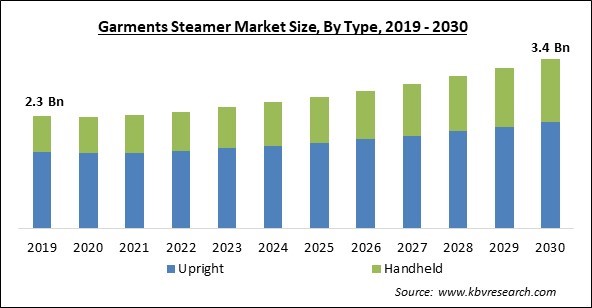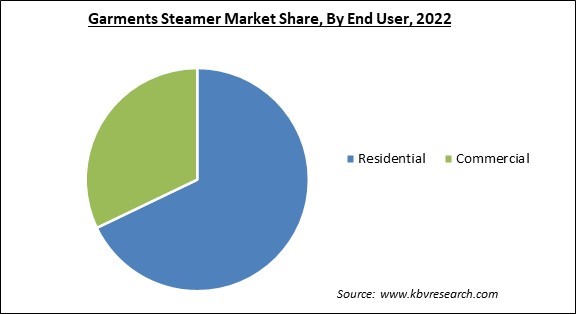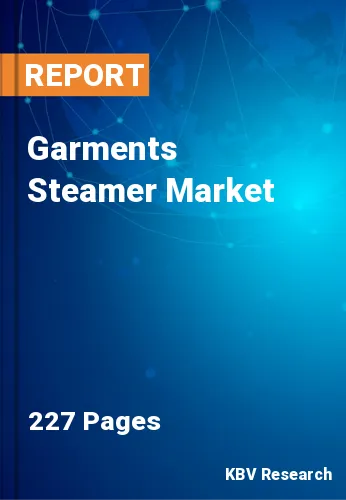The Global Garments Steamer Market size is expected to reach $3.4 billion by 2030, rising at a market growth of 4.9% CAGR during the forecast period.
Many steamers for clothes are made to be portable and light, which makes them simple to take with you when you travel. Their portability has boosted their popularity, particularly among frequent travelers. Therefore, the Handheld segment will acquire around 40% share in the market by 2030. As clients look for alternatives to save them time, portable garment steamers are a valuable and efficient solution for removing wrinkles and revitalizing clothing. Handheld steamers are ideal for fast touch-ups and travel because of their lightweight design and compact size. Since they use less electricity and less water and don't need ironing boards, handheld steamers are a more environmentally friendly alternative to conventional ironing. This feature influences the sales of portable garment steamers since it is in line with customers' increased environmental consciousness. Some of the factors impacting the market are trending technological developments, rising working population across geographies and less productive than a steam iron.

Throughout the years, technological progress has continuously prompted the development of garment care appliances. Design, aesthetics, the functional properties of the product, and rapid steaming are all factors considered in creating fabric care appliances. In addition, advancements in garment care steamers have made steaming simpler and less time-consuming by providing a range of reasonably priced options. Automatic continuous steam for simple wrinkle removal Auto-shutdown in the event of a lack of water or excessive temperature. Utilizing an anti-calcification filter improves the efficacy of the radiator by reducing calcium accumulation. Moreover, the demand for garment steamers has increased as the working population in various countries has grown. Due to their hectic lifestyles, people prefer to use portable devices to complete their duties efficiently and swiftly. The domestic appliances business of Philips was acquired by Hillhouse Investment firm, according to which Hillhouse Investment firm may manufacture and sell the domestic brands in the brand name of Philips, allowing Philips to expand its business in multiple countries and several other segments for improved results. Thus, technological developments in garment steamers product and due to the product's widespread demand, the market may experience significant growth during the forecast period.
However, although garment steamers save much time and effort when eradicating creases from clothing, they cannot completely replace laundering. Some garments require a gentle touch to remove obstinate wrinkles, which a steamer cannot provide. This means that there will still be some garments that need ironing, so the steamer should only be used as a substitute for daily steam laundering. Although garment steamers are relatively simple, they can be challenging to master. Users must understand how much water the steamer contains and how long they should steam various fabrics to achieve optimal results. Due to these factors, most users prefer steam irons to steamers, impeding market expansion.
By end-user, the market is classified into residential and commercial segments. The residential segment registered the maximum revenue share in the market in 2022. Due to changes in lifestyle and a rise in disposable money, there is a surge in demand for fabric care and cleaning equipment among home end users. The popularity of smart portable appliances among home users is growing. Customers choose highly developed built-in garment steamers to increase efficiency and provide time-saving solutions.

Based on type, the market is segmented into portable and upright. In 2022, the upright segment held the highest revenue share in the market. The growing need for effective and efficient fabric care solutions in both residential and commercial settings drives upright garment steamers' sales. Strong and versatile, upright garment steamers can effectively eliminate wrinkles and revive various fabrics, including clothing, curtains, and upholstery. They are particularly well-liked by those who own many clothes or routinely handle delicate fabrics that need careful steaming.
Based on sales channel, the market is categorized into supermarkets/hypermarkets, brand outlets, retail shops, e-commerce, and other segments. The supermarkets/hypermarkets segment covered a considerable revenue share in the market in 2022. The availability of a wide variety of brand options is one thing that draws customers to these distribution channels. Additionally, customers can more easily evaluate quality and price at supermarkets, which is fueling the segment's expansion.
| Report Attribute | Details |
|---|---|
| Market size value in 2022 | USD 2.4 Billion |
| Market size forecast in 2030 | USD 3.4 Billion |
| Base Year | 2022 |
| Historical Period | 2019 to 2021 |
| Forecast Period | 2023 to 2030 |
| Revenue Growth Rate | CAGR of 4.9% from 2023 to 2030 |
| Number of Pages | 227 |
| Number of Table | 350 |
| Report coverage | Market Trends, Revenue Estimation and Forecast, Segmentation Analysis, Regional and Country Breakdown, Companies Strategic Developments, Company Profiling |
| Segments covered | Type, Sales Channel, End User, Region |
| Country scope | US, Canada, Mexico, Germany, UK, France, Russia, Spain, Italy, China, Japan, India, South Korea, Singapore, Malaysia, Brazil, Argentina, UAE, Saudi Arabia, South Africa, Nigeria |
| Growth Drivers |
|
| Restraints |
|
Region wise, the market is analyzed across North America, Europe, Asia Pacific, and LAMEA. The Asia Pacific region led the market by generating the highest revenue share in 2022. Important changes in the market are affecting the growth and potential of fabric care appliances in the Asia-Pacific region. Due to changing consumer preferences in the area and increased discretionary expenditure, fabric care appliances are in great demand. As economies grow and urbanization progresses, more families adopt advanced fabric care technology to meet their garment maintenance needs.
Free Valuable Insights: Global Garments Steamer Market size to reach USD 3.4 Billion by 2030
The market research report covers the analysis of key stake holders of the market. Key companies profiled in the report include Haier Smart Home Co., Ltd. (Haier Group Corporation), Koninklijke Philips N.V., Groupe SEB, Midea Group Co., Ltd., Panasonic Holdings Corporation, Hamilton Beach Brands, Inc. (Hamilton Beach Brands Holding Company), AB Electrolux (Electrolux), Conair LLC (American Securities LLC), Guangdong Chigo Air conditioning Co., ltd. and Jiffy Steamer Company, LLC.
By Type
By Sales Channel
By End User
By Geography
The Market size is projected to reach USD 3.4 billion by 2030.
Trending Technological Developments are driving the Market in coming years, however, Less productive than a steam iron restraints the growth of the Market.
Haier Smart Home Co., Ltd. (Haier Group Corporation), Koninklijke Philips N.V., Groupe SEB, Midea Group Co., Ltd., Panasonic Holdings Corporation, Hamilton Beach Brands, Inc. (Hamilton Beach Brands Holding Company), AB Electrolux (Electrolux), Conair LLC (American Securities LLC), Guangdong Chigo Air conditioning Co., ltd. and Jiffy Steamer Company, LLC.
The expected CAGR of this Market is 4.9% from 2023 to 2030.
The Ecommerce segment is leading the Market by Sales Channel in 2022; thereby, achieving a market value of $1.1 billion by 2030.
The Asia Pacific region dominated the Global Garments Steamer Market by Region in 2022 and would continue to be a dominant market till 2030; thereby, achieving a market value of $1.4 billion by 2030.
Our team of dedicated experts can provide you with attractive expansion opportunities for your business.

